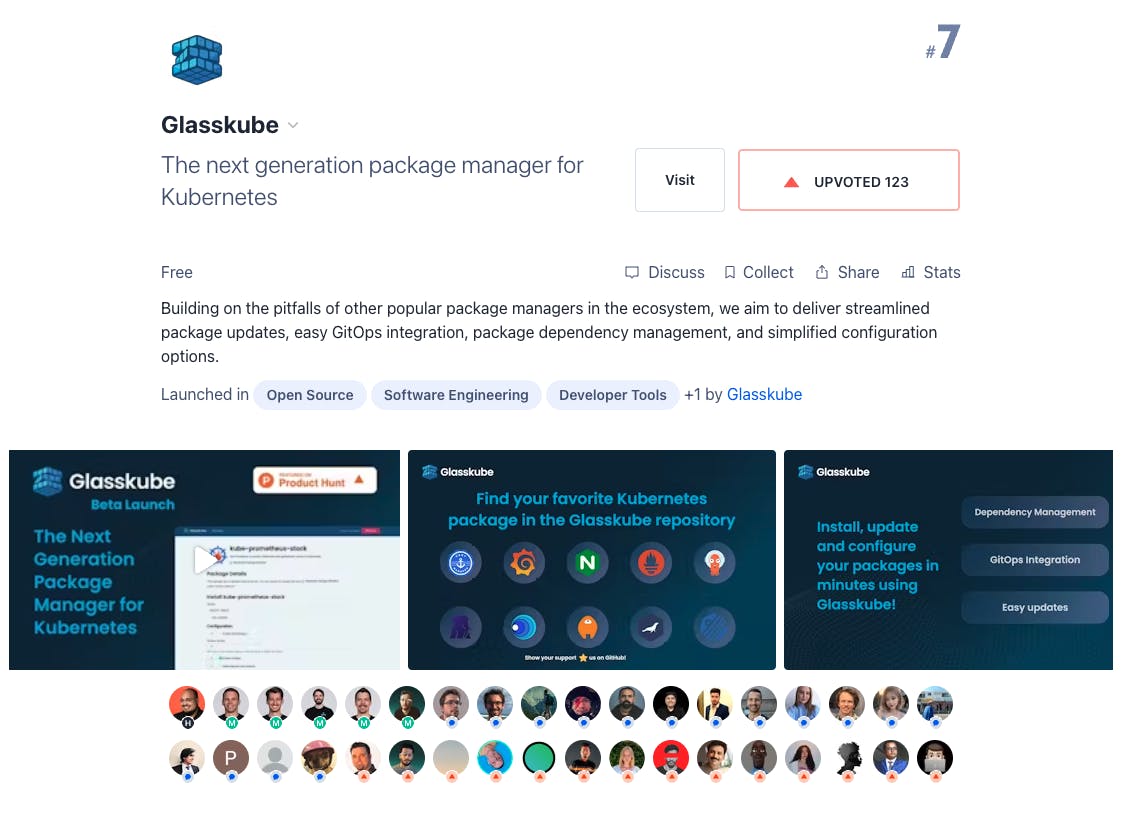Glasskube has been on a tear lately. 🚀
Having only just launched officially last February and having been received incredibly positively by the cloud native and Kubernetes community we are happy to announce that Glasskube Beta is upon us. The Glasskube team as well as the growing community of Glasskube open source contributors have rallied and combined forces to bring the Beta release sooner than expected. Everybody involved deserves a huge round of applause. 👏
We are live on Product Hunt 😺
If you like what we are building, please head on over to Product Hunt and support us over there. Let's try to make it to 200 upvotes!
👉 https://www.producthunt.com/posts/glasskube
As we release Glasskube Beta we aim to bring to Kubernetes engineers tasked with maintaining the lifecycle of the packages that make up their clusters with an expanded and more mature version of Glasskube that delivers on the early promises of on app package configuration, automated updates and an ever growing package catalogue. The Beta release is still not intended to be run in production environments, in order to become production ready in the upcoming releases we hope to get valuable feedback from the Glasskube community.
{% embed https://www.youtube.com/watch?v=ONNUP7l7WJMWhat new features to expect ✨ %}
We are so excited to get this release in the hands of all of you and see what you think. Here as some of the features and updated shipped:
👍 Easy package configuration options
🏗️ Added dependancy management
📊 Shipped graph-based dependency validation
🆕 Supported three new packages
✨ Many CLI and UI upgrades
Easy package configuration 📦
One of the main issues we see with traditional Kubernetes package managers is the inability to configure packages without having to depend on third party configuration tools to get the job done. Now with Glasskube if your package depends on additional configuration steps it can be done right in the UI or CLI. Let’s take the example of the k8sgpt-operator, you can decide on which language you want the operators output to be in as well as being able to add the OpenAI API key upon installation to make sure k8sGPT runs right out of the gate.

New package integrations 🆕
We added to the package catalogue, actively supporting 10 packages. Check out to see both the supported and upcoming packages we will support next right here.

Grafana
Grafana open source software enables you to query, visualize, alert on, and explore your metrics, logs, and traces wherever they are stored. Grafana OSS provides you with tools to turn your time-series database (TSDB) data into insightful graphs and visualizations. The Grafana OSS plugin framework also enables you to connect other data sources like NoSQL/SQL databases, ticketing tools like Jira or ServiceNow, and CI/CD tooling like GitLab.
K8sGPT
K8sGPT is a tool for scanning your kubernetes clusters, diagnosing and triaging issues in simple english. It has SRE experience codified into its analyzers and helps to pull out the most relevant information to enrich it with AI.
Kube Prometheus stack
A collection of Kubernetes manifests, Grafana dashboards, and Prometheus rules combined with documentation and scripts to provide easy to operate end-to-end Kubernetes cluster monitoring with Prometheus using the Prometheus Operator.
Next packaged to be supported ⏭️
Litmus
Litmus is an open source Chaos Engineering platform that enables teams to identify weaknesses & potential outages in infrastructures by inducing chaos tests in a controlled way.
Kubeflow
The Kubeflow project is dedicated to making deployments of machine learning (ML) workflows on Kubernetes simple, portable and scalable. Their goal is not to recreate other services, but to provide a straightforward way to deploy best-of-breed open-source systems for ML to diverse infrastructures. Anywhere you are running Kubernetes, you should be able to run Kubeflow.
Robusta
Robusta is an open source observability tool for Kubernetes, which extends Prometheus. Using automation rules, Robusta automatically fetches the data you need to investigate, and attaches it to your alerts.
Check our of webinar last Tuesday with Kunal Kushwaha 🌐
Here Glasskube co-founder Philip Miglinci walked us through the new Glasskube features, improvements and gave a greate demo that included how to install and manage kubernetes packages using a GitOps framework by leveraging ArgoCD and a super simple process to seemlessly manage your cluster package stack. Really cool talk!
{% embed https://www.youtube.com/watch?v=cphFMYivSyU %}
We launched on Product Hunt 😼
We are currently launching the project on Product Hunt.
It is being a great exercise to get Glasskube in front of an audience that we might not have known about the project. Product Hunt isn’t best know for showcasing developer tools but he got a great reception from the community and some stellar feedback too. Well worth the effort.

With you help we can get up to 200 upvotes. 🎉
Feedback wanted 🙏
Glasskube is a tool designed for Kubernetes enthusiasts and engineers alike. As we're currently in the early stages of development, your feedback could be pivotal in shaping the direction and features of our upcoming product roadmap. We invite you to explore Glasskube Beta, integrate it into a non-production Kubernetes cluster, and experience a streamlined approach to managing your third-party cloud-native packages. Share your experience with us, and help us refine Glasskube for optimal usability and effectiveness.
If you the project please consider supporting us by giving us a Star on GitHub 🙏



